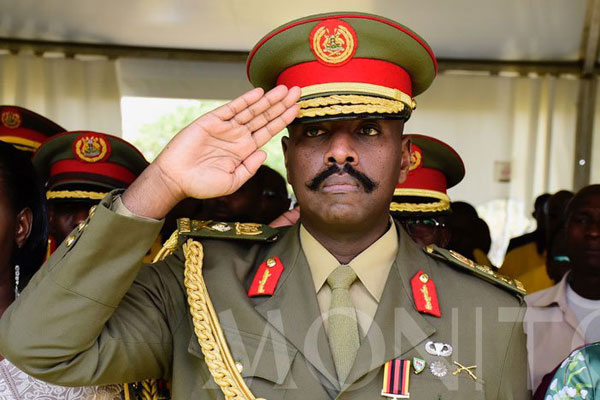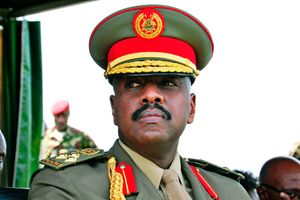
Uganda's President Yoweri Museveni's son Gen Muhoozi Kainerugaba salutes during his pipping ceremony in Kampala, Uganda in 2019.
The appointment of Uganda’s President Yoweri Museveni’s son, General Muhoozi Kainerugaba, as Chief of Defence Forces has reignited a succession debate.
To some, the general, who still serves as presidential adviser in charge of special operations to his father, this job effectively removes him from the public sphere, keeps him occupied and diverts his attention from active politics and mobilisation for support of his newly launched political grouping, Patriotic League of Uganda.
Formed and launched last month, the political grouping, which had metamorphosed from the MK Movement, has been seen as the political vehicle for Gen Muhoozi to fight for the presidency as the country prepares for the 2026 general election.
Over the past two years, Gen Muhoozi, who announced his presidential bid on Twitter — later X— has mobilised the youth, local leaders and Members of Parliament to his side, promising that he would contest the presidency in 2026.
“The Prime Minister of the UK is 42 years old, and the Prime Minister of Finland is 37 years old. Some of us are hitting 50 years old. We are tired of waiting forever. We will take a stand! Fidel Castro, my HERO, became President at 32 years old. The Presidency of the nation is meant for young men. How many agree with me that our time has come? Enough of the old people ruling us. It’s time for our generation to shine,” Gen Muhoozi wrote in a tweet in May last year.
Described as the leader of his generation, Gen Muhoozi, who turns 50 in a month, has expressed impatience with the Old Guard and even castigated his father’s party, the ruling National Resistance Movement, for “failure” to serve the people, wastage of resources, and widespread corruption.
“There is only Truth and Lies! The time for the people to choose between them is fast approaching,” he said of his father’s team, adding that the “nonsense of certain people stealing our people’s wealth because they are ‘Connected’ will cease forever! We shall rebuild our country and indeed rehabilitate it from the ravages of Corruption.”
These sentiments resonated with the feelings of the people after reports that several of his father’s ministers, including prime minister and Speaker of Parliament, shared iron sheets that were meant for the vulnerable people of Karamoja last year.
But, for nearly a year now, Gen Muhoozi, save for a few parties organised by his supporters, has kept a low profile, sparking speculation that he could not be running in 2026, after all, even when his supporters insisted he was the “standby generator,” without knowing when that “generator” will be needed or switched on.
As it turns out, the “generator” may have to stay off for some time.
President Yoweri Museveni, who had kept the country guessing his political plans for 2026, finally came out to launch an update of the party’s voters’ register, ostensibly sending the message that he will be heading the same party to seek the seventh term in 2026.
The launch of the register and the fact that the president made it a big deal signalled the launch of his bid, especially after he had kept the country guessing on whether he would contest or back his son.
Senior presidential adviser on political affairs Hajat Hadijah Namyalo, while meeting party leaders, district chairpersons and registrars reminded them to support President Museveni’s bid for re-election. The party’s electoral commission chairman Dr Tanga Odoi said President Museveni was the only NRM flag-bearer for the 2026 election.
As he engaged in politicking, quite against the army rules, Gen Muhoozi was aware of the risks he was taking. The new appointment will serve as a reminder that he is a serving soldier and should steer clear of politics.
The Political Parties and Organisations Act (Section 16) prohibits members of the Uganda People’s Defence Forces, Uganda Police Force, the Uganda Prisons Service or a public officer or a traditional or cultural leader or a person employed in a company wholly owned by the government from forming and participating in activities of political parties.
The Constitution of Uganda, in Article 208(2), requires members of the UPDF to be non-partisan and subordinate to civilian authority.
For now, Gen Muhoozi’s political future is undetermined. But to his supporters, such as the designated state minister for youth and children affairs Balaam Barugahara, his appointment means an indirect handover of power from his father.
As Chief of Defence Forces, Gen Muhoozi is now officially the second most powerful man in the country after his father, and political analysts say President Museveni’s latest move is to help the son and the MK Movement vice-president, Mr Barugahara — whose appointment as minister surprised many — to have access to “right” people and resources for mobilisation.
They have been denying the Muhoozi Project for a long time, but now we see it coming to fruition, analysts say.
Some say a dynasty has now been born — Gen Muhoozi and Barugahara have been given positions to help them learn how government works and prepare to take over power.
A few weeks ago President Museveni, launched a report that he described as a new direction the army will take, with an element of “delegated authority,” which places all elements of the army and security under the Chief of Defence Forces.
In what looks like a calculated move, the army structure seems to put a lot of powers in the hands of CDF, at the time Gen Wilson Mbadi, only to be replaced by Gen Muhoozi before he exercised the powers.
The launch of the “reforms” came after many “historical” members of the UPDF had retired, heralding a new chapter in the leadership of the army and putting young officers in charge. Historicals include officers who fought with President Museveni in the 1981-86 Bush War before he captured power 38 years ago.
For now, all the elements of security services and the army, including the Special Forces Command — an elite force charged with protecting the president, members of his family, and the country’s strategic assets — are directly under Gen Muhoozi.
His trusted lieutenants, who have been mobilising and are solely responsible for his support base — Mr Barugahara, Phiona Nyamutoro, and Lillian Aber — have been appointed ministers in the reshuffle announced on Thursday, revealing his influence even in Cabinet appointments.
Justice Minister Norbert Mao, president of Uganda’s oldest party, the Democratic Party, who joined the government, was quoted as saying his job is to manage the transition from the Old Guard to the young generation.
Addressing people in Southwestern Uganda, Mr Mao said: “I appeal for the support of the people on the assignment I have been given. The transition will be in three phases: Phase I is the one we’re in, and phase II is the one I saw you people signing (endorsing Museveni for 2026). I believe by 2031 we shall have a new Uganda. Uganda will be built on the dreams of the young people.”
Although the President denied discussing such a plan with Mr Mao, many of Gen Muhoozi’s supporters believed Mao was preparing the ground for Gen Muhoozi through legal means, including an alleged plan to change the constitution to allow only parliament to elect the president in 2031.
But Gen Muhoozi’s chances of being widely accepted by the public -- of being genuinely voted in by a majority -- are seen by some as slim, with NRM loyalists being divided on the merits of his rise and preparation for the country’s top seat.
Some political analysts think that Gen Muhoozi has grown up with a massive sense of entitlement, making him arrogant, deluded and complacent.
“If you had fought in the bush, then struggled for decades to build a democracy, how would you feel to be sidelined in favour of an entitled upstart, whose only qualification is his DNA?” said David Cecil, a former lecturer in politics at Cavendish University in Kampala.
Mr Cecil said that even though all signs are that Gen Muhoozi is getting closer to taking over from his ageing father, his biggest challenge is public relations, because of the perception that he has risen rapidly through the military and political ranks without having gained the relevant experience.
“This perception of him as naive has been exacerbated by his tweets on controversial statements about sensitive matters, like the conflicts in Tigray (Ethiopia), Ukraine, and M23 rebels (taking controversial positions in these issues). With these bold and partial statements, he comes off as arrogant and impulsive, rather than measured and statesmanlike; it would have been better if remained silent,” Mr Cecil added.
While Gen Muhoozi himself has been described as lacking in charisma, he has a huge following on X and is said to have an “army” of supporters on social media, who are drumming up support for him or attacking anybody with a different view from their man’s. He has also attracted genuine and opportunistic supporters in the countryside, who throng his parties wherever they are, with the last one being held in Masaka, central Uganda, a week ago.
“With this in mind, he’ll simply be a figurehead and a vehicle for other interests: Members of his family and leading figures of the NRM, who can’t themselves stand for office,” Mr Cecil said.
now in the top position of the army, the security and management of the father’s vote will be assured in 2026. Any popular uprising or protests will be decisively dealt with.
Gen Muhoozi’s heavy hand was alleged in the quelling of the November 2020 protests in Kampala after the arrest of National Unity Party (NUP) president Robert Kyagulanyi, in which more than 50 people were killed, dozens injured, and hundreds arrested.





